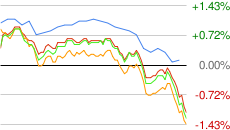
It was great to see many Canadian marketing and PR blogs show up on the AdAge Power150 developed by Todd Andrlik. The current list includes:
- Adgoodness: Frederick Samuel showcases the best (and sometimes the worst) advertising the world has to offer.
- One Degree: A Canadian take on Internet marketing featuring the views of a stellar cast of Canadian marketing practitioners.
- Canuckflack: Long-time blogger Colin McKay draws from his eclectic interests to comment on all things online that interest him. And he shows just how interesting a sharp mind can be in the process.
- Twist Image: Mitch Joel, Canada’s “mini-Seth,” blogs, podcasts, speaks and in the process creates a one man promotion industry. His enthusiasm is infectious.
- Blogging Me Blogging You: Ed Lee knocks down the barriers between PR and digital media. Ed’s a transplanted Brit, but we’re happy to claim him as ours now.
- My Name is Kate: Online marketer Kate Trgovac has two blogs on the Power150: One Degree and her personal blog, My Name is Kate. She clearly knows something that the rest of us want to figure out.
- CrapHammer: Sean Howard has sent his blog into rapid ascent through edgy content and strong SEO.
- thefruitsofimagination: a blog written by the employees of Leo Burnett Toronto. And agency blog! Why aren’t more companies doing this?
I have to confess that I was unfamiliar with some of these blogs. That’s one of the good things about lists like the Power150. Whether you agree with the rankings or the methodology or even the implicit competition (who can really deny being tickled to be on a list like this?), these lists expose us not only to the well established, but also to new voices who are making a mark.
I’d never come across Adgoodness, CrapHammer or thefruitsofimagination. But, as a result of discovering them on the list, I’ve subscribed to each. So the time I spent looking at the Power150 has yielded the return of discovery of three new blogs. That’s a pretty good ROI for a Sunday afternoon.

 It looks like the Third Tuesday Vancouver social media series of monthly events is a go. A dozen social media folks came out Monday evening to discuss bringing the events to Vancouver. At the end of the evening, new friendships had been made and the group agreed to launch the series.
It looks like the Third Tuesday Vancouver social media series of monthly events is a go. A dozen social media folks came out Monday evening to discuss bringing the events to Vancouver. At the end of the evening, new friendships had been made and the group agreed to launch the series.


 Recently,
Recently,